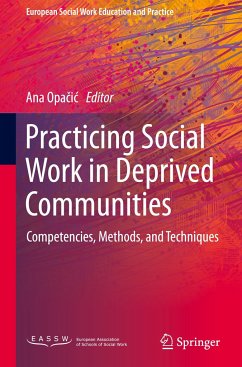
Social Work Practice Education Beyond the Pandemic
Comparative Perspectives on Continuities, Adaptations and Innovations
Herausgegeben: Guidi, Riccardo; Spatscheck, Christian

PAYBACK Punkte
46 °P sammeln!
This book offers unprecedented knowledge about how social work practice education has been restructured under the challenges of the COVID-19 pandemic and how the adaptations and innovations generated during this time have become a supplementary tool of current social work education worldwide. Based on the European research project "SWooPEd - Social Work Practice Education in Times of Pandemics, and Beyond. Continuities, Changes and Innovations in Europe", this contributed volume provides a unique international perspective from different European countries that are accomplished through insights...
This book offers unprecedented knowledge about how social work practice education has been restructured under the challenges of the COVID-19 pandemic and how the adaptations and innovations generated during this time have become a supplementary tool of current social work education worldwide. Based on the European research project "SWooPEd - Social Work Practice Education in Times of Pandemics, and Beyond. Continuities, Changes and Innovations in Europe", this contributed volume provides a unique international perspective from different European countries that are accomplished through insights from authors in other continents.
The book addresses topics through a 'glocal' approach, using a comparative perspective and a multi-method design. It adopts the IASSW-IFSW "Global Standards for Social Work Education and Training", as well as considers the heterogeneity of national social work education systems in Europe, North America, Africa, and the Asia and Pacific region. The volume's contents are organized in three sections:
In Part I, the authors compare the structures and designs of social work practice education programs and the reactions of the schools of social work to the COVID-19-related restrictive measures on a European level.In Part II, the authors provide in-depth analyses on how the pandemic experimentations have been re-adapted and used in some European countries and which innovations and findings were identified that could be integrated now and in the context of other crises.In Part III, the authors contextualize these experiences and display the paths and analyses from schools in non-European countries, as well as finally identify the crucial current challenges and opportunities for social work practice education at a global level.
Social Work Practice Education Beyond the Pandemic is a key reference for the global community of social work education including academics, educators, field instructors, practitioners, and students. It provides an inspiring source for all the innovators in the field of higher education in social work and highlights how social work practice education can be designed in a more resilient and sustainable way that directs social work practice education into the future.
The book addresses topics through a 'glocal' approach, using a comparative perspective and a multi-method design. It adopts the IASSW-IFSW "Global Standards for Social Work Education and Training", as well as considers the heterogeneity of national social work education systems in Europe, North America, Africa, and the Asia and Pacific region. The volume's contents are organized in three sections:
In Part I, the authors compare the structures and designs of social work practice education programs and the reactions of the schools of social work to the COVID-19-related restrictive measures on a European level.In Part II, the authors provide in-depth analyses on how the pandemic experimentations have been re-adapted and used in some European countries and which innovations and findings were identified that could be integrated now and in the context of other crises.In Part III, the authors contextualize these experiences and display the paths and analyses from schools in non-European countries, as well as finally identify the crucial current challenges and opportunities for social work practice education at a global level.
Social Work Practice Education Beyond the Pandemic is a key reference for the global community of social work education including academics, educators, field instructors, practitioners, and students. It provides an inspiring source for all the innovators in the field of higher education in social work and highlights how social work practice education can be designed in a more resilient and sustainable way that directs social work practice education into the future.












